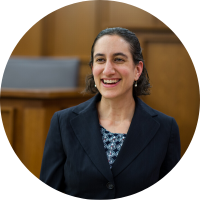SCOTUS rules on Our Lady of Guadalupe School v. Morrissey-Berru, Law School faculty react
 Serena Mayeri, Professor of Law and History
Serena Mayeri, Professor of Law and History
When the Supreme Court first recognized the ministerial exception in a unanimous decision in Hosanna-Tabor Evangelical Lutheran Church and School v. EEOC (2012), the Justices agreed that the First Amendment protects religious entities, including religious schools, from interference in vital decisions about whom to hire and retain as clergy. The Court—and the Lutheran Church–classified the religious school teacher in Hosanna-Tabor as a minister; as such, employment discrimination laws did not protect her. Though the Church offered a religious rationale for the teacher’s firing in that case, the Court made clear that the ministerial exception applies to clergy regardless of whether religious tenets motivate the employer’s actions.
In Hosanna-Tabor, the Court announced “no rigid formula” for deciding which employees would be subject to the ministerial exception, but historically the exception has been applied narrowly. Our Lady of Guadalupe School v. Morrissey-Berru, by contrast, expands the ministerial exception to cover two lay teachers who alleged that their Catholic school employers discriminated against them based on age and disability, respectively. The majority opinion extends the considerable deference already afforded religious employers. First, the ruling enlarges the category of employees who cannot bring claims of discrimination based on race, color, sex, national origin, age, and disability to include laypeople—even those who do not share the employer’s religious faith. Second, the majority defers to religious employers’ own subjective assessments of whether an employee is central enough to the institution’s religious mission to fall under the ministerial exception. Needless to say, employers facing potential liability have a strong incentive to characterize even employees with primarily secular responsibilities as performing “vital religious duties” in order to exempt themselves from anti-discrimination laws.
As Justice Sonia Sotomayor writes in dissent, the majority’s view, taken to its logical conclusion, “permit[s] religious entities to discriminate widely and with impunity for reasons wholly divorced from religious beliefs.” Together with other recent rulings in cases involving access to contraception and public funding for religious institutions, the Court’s growing willingness to exempt religious entities from generally applicable laws should alarm those who are committed to the constitutional values of equality, liberty, and separation of church and state.





